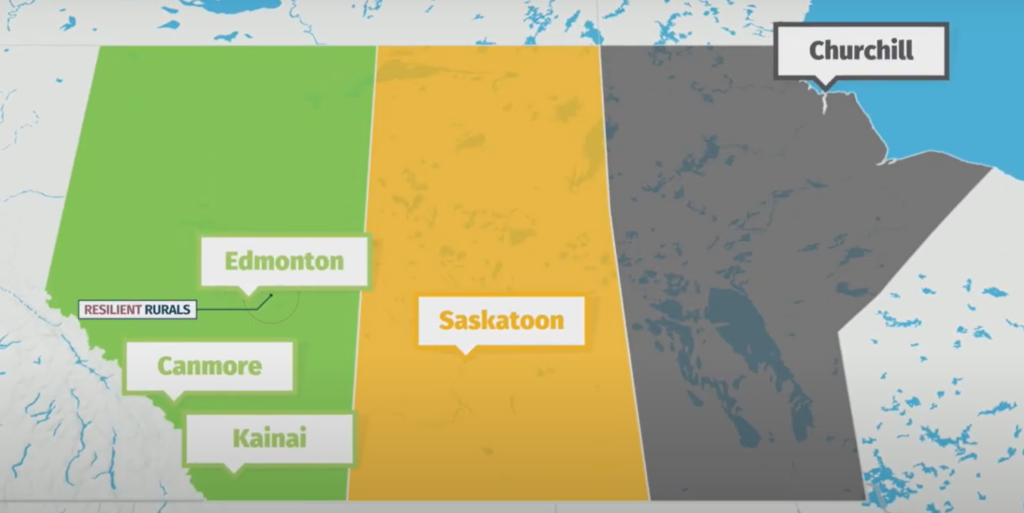13 Jan, 2022
Community Action: How the Prairies are Adapting to Climate Change
Though British Columbia and Atlantic Canada’s flooded communities have made recent headlines in late 2021, the Prairies are no exception when it comes to experiencing extreme weather. With catastrophic floods, hailstorms, and droughts in recent years, several rural and urban communities in the Prairies are putting plans in place that consider how they can boost their preparation, reduce vulnerabilities, and grow more resilient.
To help inspire Prairie-based communities towards greater climate resilience, ClimateWest and the Prairie Climate Centre, have launched a short film that profiles local leaders and their governments’ efforts to prioritize climate impact risks and prepare for changes to come.
“The floods of 2013 were an example of a really catastrophic event. There were several thousand people who were evacuated from their homes. I mean, a municipality’s responsibility is to look out for the best interests of our community, to be more resilient in the future.” – Lori Rissling Wynn, Town of Canmore
The film, created by the team at the Prairie Climate Centre, features diverse perspectives from across the Prairie provinces, including:
- Large urban centres, like Edmonton and Saskatoon;
- Smaller, more rural communities like Canmore, AB, Churchill, MB, and a joint initiative (“Resilient Rurals”) between Bruderheim and Gibbons, AB; and
- Kainai First Nation in Treaty 7 (southern Alberta).

This film begins to de-mystify the preparation and planning work for local governments and communities in the face of climate change in the Prairies. It also acknowledges the great work already underway in many places and aims to inspire more communities to take up the imperative to plan and prepare.
“We talk to stakeholders and just have really good open-ended conversations about, ‘What would happen to your business, or your ability to serve citizens if these things occurred?’ And then we thought about, ‘Okay, what is the likelihood and consequence of each of these types of changes happening?’ And so where should we essentially focus our planned resources?” – Amber, City of Saskatoon
The knowledge and experiences captured in the film reflect the frontline planners who build buy-in for risk assessments, organize inputs across their local government and often wider-community, and put pen to paper to create the plans themselves.
“Adaptation planning is a collaborative process that entails multiple steps. Often, using climate data and understanding your risks are a part of this process as it can help create a fuller understanding of the impacts of a changing climate, but it’s important to know what data you need, where to find it and how to make it locally relevant” – Bryce Gallant, ClimateWest Help Desk
Climate data is one critical element of the larger process that is adaptation planning. ClimateWest is seeking to create awareness, provide education and develop capacity to make accessing and applying this data easier for Prairie-based communities and people.
 |
To do so, the Prairie Climate Centre created a guide for ClimateWest that provides an overview of credible resources that offer free access to climate data about the future. Focusing on climate information needs within the Prairie provinces of Canada, the guide outlines where different types of climate data reside and some basics for how climate information and data can be used in risk management and adaptation planning.
In terms of the process to work through a climate risk assessment and/or adaptation plan, there are many existing tools, guidelines, and supports that are freely available. In fact, ClimateWest has documented over 35 different guides that serve municipalities of different size, stage, and capacities.
The list below shares some of the most commonly used guides/toolkits in Canada for community action:
- Guide for Integrating Climate Change Considerations into Municipal Asset Management
- Building Adaptive and Resilient Communities Online Tool
- Guide for Municipal Climate Change Staff
- Climate Resilience Express Action Kit
- Climate Change Adaptation Planning and Local Early Action Plan: A Guide for Indigenous Communities
- Adapting to Climate Change: An Introduction for Canadian Municipalities
- Hazard Identification Risk Assessment: Methodology Guidelines
- Climate Change Adaptation Planning: A Handbook for Small Canadian Communities
- Canadian Communities’ Guidebook to Adaptation to Climate Change
If this feels a little overwhelming, not to worry! ClimateWest is here to support you and your community on its climate adaptation journey. Whether you are inspired by the great work other communities across the Prairies are doing, need support figuring out where to start, or need some assistance overcoming barriers in your adaptation planning, get in touch with us through our Help Desk, email us at info@climatewest.ca or call 204-995-6514 to help pair you with the right information!
